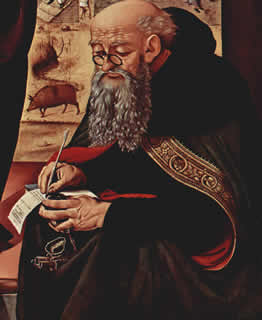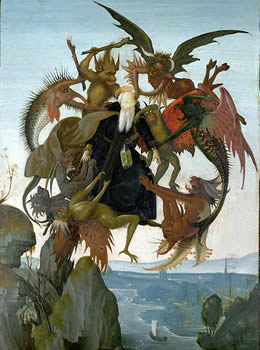"They Took Offense at Him"
Losing Your Mind to Find Your Way
For Sunday July 8, 2012
Lectionary Readings (Revised Common Lectionary, Year B)
2 Samuel 5:1–5, 9–10 or Ezekiel 2:1–5
Psalm 48 or Psalm 123
2 Corinthians 12:2–10
Mark 6:1–13
"A time is coming," said the desert dweller saint Anthony, "when men will go mad, and when they see someone who is not mad, they will attack him, saying, 'You are mad, you are not like us.'"
Anthony wasn't like most people, that's for sure. He was an uneducated Copt born in 251 AD into a Christian family of peasant farmers. When he was eighteen, his parents died, leaving him to care for his younger sister. Six months later, the gospel reading in church one Sunday was Matthew 19:2: "If you would be perfect, go, sell what you possess and give to the poor, and you will have treasure in heaven." Anthony put his sister into the care of nuns, sold his possessions, and attached himself to an ascetic on the fringe of his village. Later, he went deep into the desert alone. People followed him there for advice, though, and for a while he offered counsel. Later still, he returned to his life of solitary spirituality in the vast loneliness of the Egyptian desert.
 |
Jesus's family thought he was mad. They tried to take custody of him. "He's lost his senses," they said. John writes that his brothers didn't believe in him. The villagers said he was insane and demon-possessed. Boyhood friends in Nazareth tried to kill him. The religious experts said he was a glutton and drunkard who partied with sinners. Many of his closest supporters stopped following him. At the end of three years of public ministry, political pundits complained that he told people not to pay their taxes. And so he was executed. 1
In this week's gospel, those who knew him best "took offense at him" — literally, "they were scandalized." For his part, Jesus was "amazed at their unbelief." He then sent out his twelve disciples in pairs to village after village, warning them in advance about what they could expect.
The story of David shows how God looks at things differently than we do. David was the last and the least of Jesse's seven sons. The first six sons had all the marks of regal authority, but God told Samuel: "The Lord does not look at the things that man looks at. Man looks at the outward appearance, but the Lord looks at the heart." David might have looked like a lady's man, handsome and "ruddy," but God directed Samuel: "Rise and anoint him; he is the one." And so in this week's Old Testament reading, the least likely political successor was anointed king of Israel, and grew into its greatest leader ever.
 |
David "became more and more powerful." A poet even rhapsodized about "the city of the great king," that "God makes her secure forever" (Psalm 48:8). That nationalistic rhetoric was badly mistaken. Four hundred years later, Babylon conquered Jerusalem in 586 BC. Enemy troops ransacked the city, subjugated the land, enslaved its people, and installed a puppet government. They left behind the poor and the weak for dead, and exiled the best and the brightest to Babylon.
God sent Ezekiel the priest to those exiles. Ezekiel describes beleaguered Israel as a people of rebellion and revolt. He describes himself as "overwhelmed" at God's call on him. The sacred scroll that he symbolically ate tasted sweet, but its contents were bitter. The message that Ezekiel conveyed to the exiles was one of "lament, mourning, and woe." Why? "The house of Israel is not willing to listen to you because they are not willing to listen to me." For faithfulness to his call Ezekiel was the prophet without honor among his own people.
 |
The Corinthians similarly spurned the apostle Paul. They complained that Paul was a hypocrite — bold in his letters but underwhelming in person. In contrast to his "weighty and forceful" letters, they mocked his physical presence as "unimpressive." His speaking, they said, "amounts to nothing." Invoking biting irony, Paul apologized for preaching free of charge, and admitted that he was not a "trained speaker." The Corinthians flattered themselves with some "super-apostles" who commended themselves as superior, and who were as slick as they were expensive. But Paul warned the Corinthians that the "super" apostles were really "pseudo" apostles who exploited them. He turned the tables on the Corinthians with the paradox of a gospel of divine strength in human weakness.
Anthony, Jesus, David, Ezekiel and Paul all embodied the stark contrasts between the sacred folly of God's kingdom and the secular wisdom of worldly ways.
So does the poet-farmer Wendell Berry (born 1934). He describes these two very different ways to live in his Manifesto: The Mad Farmer Liberation Front:
Love the quick profit, the annual raise,
vacation with pay. Want more
of everything ready-made. Be afraid
to know your neighbors and to die.
And you will have a window in your head.
Not even your future will be a mystery
any more. Your mind will be punched in a card
and shut away in a little drawer.
When they want you to buy something
they will call you. When they want you
to die for profit they will let you know.
So, friends, every day do something
that won't compute. Love the Lord.
Love the world. Work for nothing.
Take all that you have and be poor.
Love someone who does not deserve it.
Denounce the government and embrace
the flag. Hope to live in that free
republic for which it stands.
Give your approval to all you cannot
understand. Praise ignorance, for what man
has not encountered he has not destroyed.
Ask the questions that have no answers.
Invest in the millennium. Plant sequoias.
Say that your main crop is the forest
that you did not plant,
that you will not live to harvest.
Say that the leaves are harvested
when they have rotted into the mold.
Call that profit. Prophesy such returns.
Put your faith in the two inches of humus
that will build under the trees
every thousand years.
Listen to carrion — put your ear
close, and hear the faint chattering
of the songs that are to come.
Expect the end of the world. Laugh.
Laughter is immeasurable. Be joyful
though you have considered all the facts.
So long as women do not go cheap
for power, please women more than men.
Ask yourself: Will this satisfy
a woman satisfied to bear a child?
Will this disturb the sleep
of a woman near to giving birth?
Go with your love to the fields.
Lie down in the shade. Rest your head
in her lap. Swear allegiance
to what is nighest your thoughts.
As soon as the generals and the politicos
can predict the motions of your mind,
lose it. Leave it as a sign
to mark the false trail, the way
you didn't go.
Be like the fox
who makes more tracks than necessary,
some in the wrong direction.
Practice resurrection.
[1] See Mark 3:21 and 6:, John 7:5 and 10:20, Luke 4:29, 23:1-2
Image credits: (1–3) Wikipedia.org;





